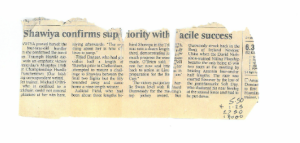At the end of one March afternoon in 1994, when I was 16 years old, our history teacher arrived later to the last lesson of the day, closed the door behind him and announced: ‘Harvie, you have a message from Death’.
The, now faded, piece of paper to which he was referring was a fax from a family friend offering a tip on a French horse called The Fellow who was running in that year’s Cheltenham Gold Cup. What followed was an illicit two-year correspondence featuring increasingly encrypted horse racing tips (the threat of interception and odds being slashed were of greater risk than expulsion) that resulted in three Cheltenham Gold Cup winning tickets. It also earned me a, well, completely unearned reputation as the most successful tipster at school, having never even stepped into a paddock. Nearly 20 years later I still carry in my wallet the race report for Shawiya’s victory at the Triumph Hurdle, my last win before I was busted.
John Jeremiah Sullivan was at least born into horse country when he went back to start researching his memoir Blood Horses: Notes of a Sportswriter’s Son. His father, Mike Sullivan, a sports writer who had covered three decades in the trade, was living his final months and Sullivan-fils asked what his most cherished memory from the press box was. ‘I was at Secretariat’s Derby, in ’73. That was…just beauty, you know?’
Sullivan had grown up listening to his dad thumping at the typewriter in the basement, watched him dose himself in not just beer, but pitchers of the stuff, but each time he tried to get himself on a level with his dad – to impress him that he had been paying attention – his dad would laugh and change the subject. The veneer of adulthood would remain impenetrable until the very end. It would take until Sullivan start on Blood Horses, long after his dad had died, before he would get to know either what that ‘beauty’ was, or indeed what ran through his father’s vein’s other than beer and Kools cigarettes.
The hardest part of writing about Blood Horses is resisting the temptation to quote sections of it at length. Sullivan could have written a book about Secretariat, although there would have been little to add to William Nack’s masterpiece on the horse. Or he could have written a memoir about his father that would have sat nicely on the shelf at home, if nowhere else. Instead, what he has written is a something that transcends the sport, horses, sport-writing itself. It is a masterclass is elegy to his late father, and quite simply the best book, of any description, I have read in the last two years.
But even that does not do it justice. And it was only when I was rifling through the boxes of letters, where I had found the fax, that I have kept from those school days – the reason for keeping I have long since forgotten – that I realized what Blood Horses really is about. For Sullivan the Secretariat Kentucky Derby of 1973 is his equivalent of Charles Kane’s Rosebud in Citizen Kane. It is a story of a relationship between father and son that was never fulfilled while he was growing up, the kind that can only be fully realized in remembrance. It is a book about coming to terms with the passing of an adored father, and a way of reaching back, one last time, to hear him clunking at his craft in the basement. It should be required reading for anyone scratching their heads at the confusion that is adulthood, wondering what it means to be a father or a son.

